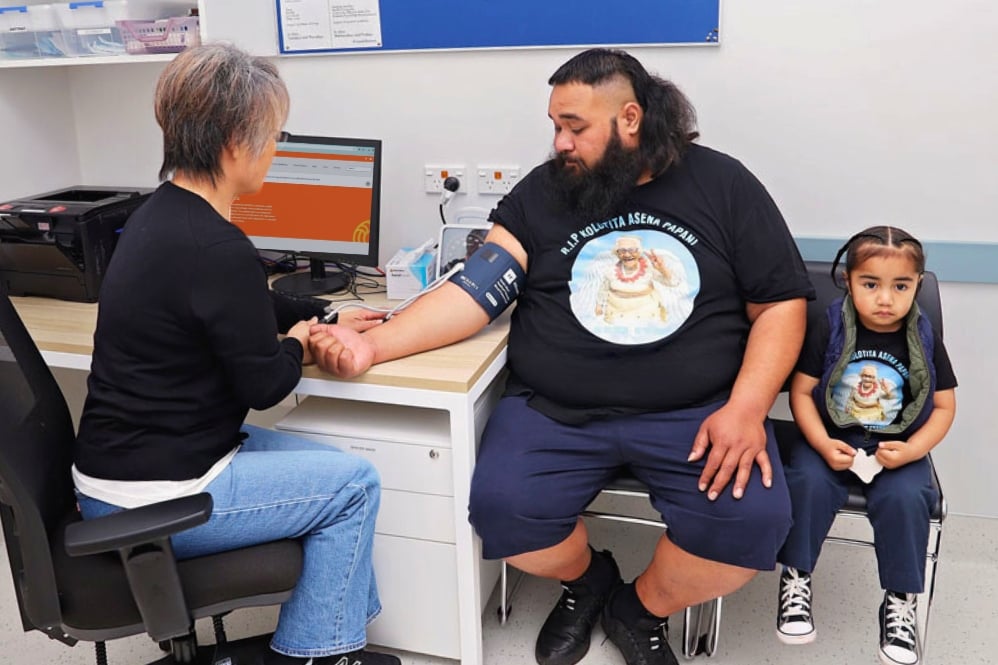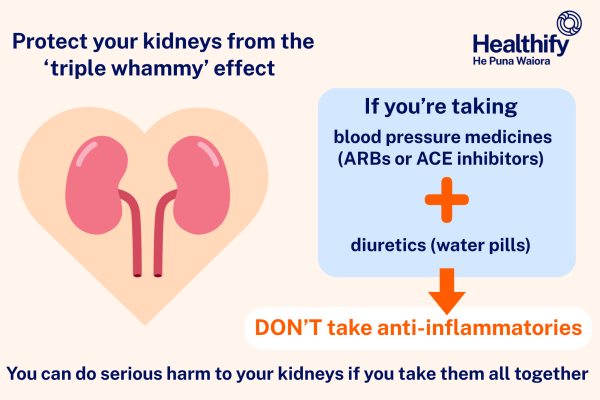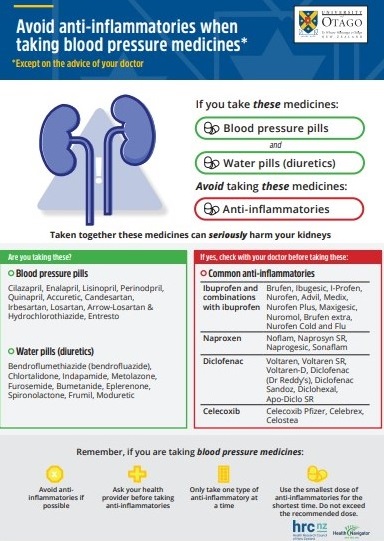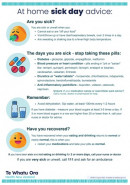You can now add Healthify as a preferred source on Google. Click here to see us when you search Google.
NSAIDs and blood pressure medicines
Also called the triple whammy effect
Key points about NSAIDs and blood pressure medicines
- Non-steroidal anti-inflammatory drugs (NSAIDs) are commonly called 'anti-inflammatories'.
- Taking anti-inflammatories while you take certain medicines for your blood pressure or heart can damage your kidneys.
- The combination of taking an ACE inhibitor (or ARB) and diuretics together with anti-inflammatories is called a ‘triple whammy’.
- Find out how to prevent kidney damage.

Non-steroidal anti-inflammatory drugs (NSAIDs) are commonly called 'anti-inflammatories' or anti-inflammatory medicines.
Taking some medicines together can cause problems. This is called a medicine or drug interaction.
A common interaction happens when you take anti-inflammatories while you're taking certain blood pressure medicines. ACE inhibitors and angiotensin receptor blockers (ARBs) and diuretics are often used to treat high blood pressure and heart failure. Taking these medicines together is safe, but it's NOT safe to take them together with anti-inflammatories.
This is called the ‘triple whammy’ effect and can damage your kidneys. Read more about acute kidney injury.
Although using anti-inflammatories with blood pressure medicines such as beta blockers and calcium channel blockers may be less harmful to your kidneys, NSAIDs must still be used very cautiously by people taking these medicines.

Image credit: Healthify He Puna Waiora
Examples of ACE inhibitors, ARBs and diuretics are listed as examples of blood pressure medicines in the section below.
Examples of anti-inflammatories are listed in the section below.
Read more about the triple whammy effect.
NSAIDs and heart problems
Studies have shown that all NSAIDs, except aspirin in low doses, can increase the chance of heart attack or stroke.
- The risk may be greater if you have heart disease or risk factors for heart disease such as smoking, high blood pressure, high cholesterol or diabetes.
- However, the risk of heart attack or stroke may also be increased even if you don't have heart disease or those risk factors.
- Heart problems caused by NSAIDs can happen within the first weeks of use.
- Heart problems may occur more often with higher doses or with long-term use.
- NSAIDs should not be used right before or after heart bypass surgery.
Read more about the risks associated with taking NSAIDs.
Most people have no problem taking anti-inflammatories, but some people are seriously harmed by these medicines.
Anti-inflammatory medicines are used for pain from headache, migraine, dental pain, back and muscle pain, arthritis, painful periods and pain following injury. They can help reduce fever, redness and swelling.
You can buy anti-inflammatories at your supermarket or pharmacy without a prescription, so you may take them without realising that they can cause harm to your kidneys.
Read more about NSAIDs and risks of NSAIDs.
Anti-inflammatories available in Aotearoa New Zealand
The ones in bold are available over the counter, the others need to be prescribed for you.
- Celecoxib (Celebrex)
- Diclofenac (Apo-Diclo SR, Diclohexal, Voltaren)
- Etoricoxib (Arcoxia)
- Ibuprofen (Advil, Brufen, I-Profen, Nurofen)
- Ketoprofen (Oruvail)
- Mefenamic acid (Ponstan)
- Meloxicam (Melorex, Mobic)
- Naproxen (Naprogesic, Naprosyn SR, Noflam, Sonaflam)
Anti-inflammatories are sometimes combined with other medicines, eg: Bi-gesic, Brufen Extra, Maxigesic, Mersynofen, Nurofen Cold and Flu, Nuromol, Parcetamol + Ibuprofen.
Blood pressure medicines that interact with anti-inflammatories to cause the triple whammy effect are ACE inhibitors, ARBs and diuretics.
If you're taking blood pressure medicines (ACE inhibitors or ARBs) and diuretics tell your healthcare provider or pharmacist before taking any anti-inflammatories. Talk to them about safe pain-relief options for you.
ACE inhibitors
Most ACE inhibitors have names that end in ‘pril’. Read more about ACE inhibitors.
ACE inhibitors available in Aotearoa New Zealand
- Captopril (Capoten)
- Enalapril (Acetec, Renitec)
- Lisinopril
- Perindopril (Coversyl)
- Quinapril
- Ramipril (Tryzan)
Angiotensin receptor blockers (ARBs)
Most ARBs have names that end in ‘sartan’. Read more about ARBs.
ARBs available in Aotearoa New Zealand
- Candesartan (Candestar)
- Losartan
- Irbesartan.
ARBs are sometimes combined with a diuretic (water pill)
- Candesartan + hydrochlorothiazide
- Irbesartan + hydrochlorothiazide (Karvezide)
- Losartan + hydrochlorothiazide
-
Sacubitril + valsartan (Entresto)
Diuretics (water pills)
Diuretics are medicines that help your body get rid of extra salt (sodium) and water. They work by increasing the amount of urine (pee) you make. Read more about diuretics.
Diuretics available in Aotearoa New Zealand
- Acetazolamide (Diamox)
- Bendroflumethiazide ( Arrow-Bendrofluazide)
- Chlortalidone (Hygroton)
- Indapamide ( Dapa-Tabs)
- Furosemide (Lasix, Urex Forte, Furosemid Stada)
- Bumetanide (Burinex)
- Amiloride (Kaluril)
- Eplerenone (Inspra)
- Spironolactone (Spiractin, Aldactone)
Diuretics are sometimes combined with other medicines, eg: Frumil, Moduretic, Karvezide, Losartan + Hydrochlorothiazide, Entresto, Candesartan + hydrochlorothiazide
- If you take blood pressure medicines, you should avoid anti-inflammatories.
- If you want to take anti-inflammatory medicines, check with your healthcare provider or pharmacist first.
- Only take 1 type of anti-inflammatory medicine at a time.
- Take anti-inflammatories sparingly – take the smallest dose you need for the shortest possible time.
- Do not exceed the recommended dose.
- Stay well hydrated by drinking plenty of water. You want your pee to be pale coloured.
Read more about how to protect your kidneys.
Brochures
Avoiding anti-inflammatories when taking blood pressure medicines University of Otago, NZ, 2021
At home sick day advice(external link) Health New Zealand | Te Whatu Ora, 2023
Medicines and side effects(external link) Healthify He Puna Waiora, NZ, 2024
5 questions to ask about your medications(external link) Health Quality and Safety Commission, NZ, 2019 English(external link), te reo Māori(external link)
References
- Angiotensin-II receptor blockers(external link) New Zealand Formulary
- Angiotensin-converting enzyme inhibitors(external link) New Zealand Formulary
- Diuretics(external link) New Zealand Formulary
- Non-steroidal anti-inflammatory drugs(external link) New Zealand Formulary
- Avoiding the triple whammy in primary care – ACE inhibitor/ARB + diuretic + NSAID(external link) BPAC, NZ, 2018
Brochures

University of Otago, NZ, 2021

At home sick day advice
Health New Zealand | Te Whatu Ora, 2023

Medicines and side effects
Healthify He Puna Waiora, NZ, 2024
Credits: Healthify editorial team. Healthify is brought to you by Health Navigator Charitable Trust.
Reviewed by: Stephanie Yee, Pharmacist, Auckland.
Last reviewed:





